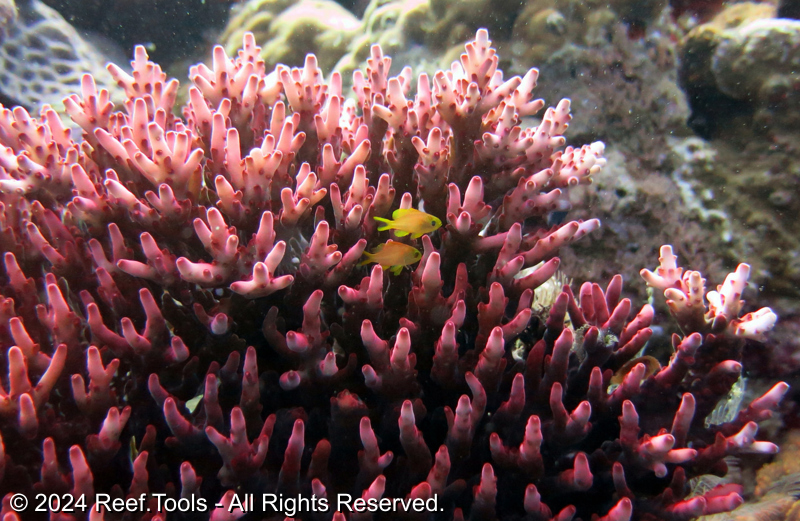Potassium (K)
Alkali Metals
Atomic Number: 19
Last Reviewed: 12/15/2024
Potassium (K) is a vital macronutrient in reef aquariums, playing a significant role in coral health, coloration, and overall ecosystem balance. Maintaining appropriate potassium levels is essential for the well⁻being of marine organisms. Potassium is an alkali metal and a major ion in seawater, crucial for various physiological processes in marine life. In reef aquariums, it supports coral skeletal formation, nutrient transport, and the functioning of symbiotic algae known as zooxanthellae.
While potassium plays a critical role in coral health, its natural stability in marine systems makes supplementation rarely necessary under normal circumstances.
Natural Seawater Levels
Potassium in natural seawater ranges between 380 and 420 ppm. This consistency is due to its ionic stability and widespread occurrence in oceanic environments.
Risks
Deficiency:
- Deficiencies are rare in aquariums with regular water changes using high-quality salt mixes.
- If depletion occurs (e.g., in systems employing aggressive nutrient export methods like zeolite reactors or excessive phosphate binders), signs may include:
- Tissue necrosis and detachment in corals.
- Reduced coral growth rates and pale coloration.
Toxicity:
- Potassium toxicity is uncommon but may occur at concentrations above 500 ppm. Symptoms include:
- Stress and mortality in sensitive invertebrates (e.g., shrimp).
- Algal blooms due to excess nutrient availability.
Relevancy
Coral Health:
- Potassium contributes to intracellular osmoregulation, enzyme activation, and chromoprotein synthesis, influencing coral coloration and skeletal growth.
- It supports the ionic balance within coral tissues, enabling efficient calcification.
Zooxanthellae Function:
- Symbiotic algae within coral tissues utilize potassium during photosynthesis, producing organic compounds that nourish their coral hosts.
Natural Stability:
- Potassium is highly stable in marine systems due to its non-reactive nature. Unlike calcium or magnesium, it does not readily precipitate or bind with organic matter, ensuring consistent levels in aquariums with regular maintenance.
Ocean Values
| Reference Name | Low | High | Optimal | Unit |
|---|---|---|---|---|
| Red Sea Ocean | 350.0000 | 420.0000 | 390.0000 | mg/L |
| Florida Ocean | 380.0000 | 450.0000 | 403.0000 | mg/L |
| Caribbean Ocean | 370.0000 | 390.0000 | 380.0000 | mg/L |
Regional Variations
Potassium concentrations in natural seawater are relatively consistent globally, with minor variations influenced by local environmental factors.
Dosage Recommendations
Target Level: Maintain potassium concentrations between 380 and 420 ppm to match natural seawater.
Adjustment: Supplementation should only be implemented based on precise measurements, avoiding overcorrection.
Handling
Testing: Perform tests only when symptoms of deficiency are observed.
Intervention: Address deficiencies or excess cautiously to avoid stress to sensitive organisms.
Reef.Tools recommends: Maintain Potassium (K) concentrations between 380.0000 and 420.0000 mg/L.
References
- Falkowski, P. G., et al. (2008). "Ocean Biogeochemistry and the Role of Potassium." Nature Reviews Microbiology. (Nature)
- Fabricius, K. E. (2005). "Effects of Terrestrial Runoff on Coral Reefs." Marine Pollution Bulletin. (Elsevier)
- Paytan, A., & McLaughlin, K. (2007). "Nutrient Cycling in Marine Systems." Annual Review of Earth and Planetary Sciences. (Annual Reviews)
- Smith, S. V., et al. (2010). "Chemical Consistency of Potassium in Marine Systems." Journal of Marine Chemistry. (Cambridge)
Difficulty
Rating: Easy
Potassium levels are naturally stable in most systems, requiring minimal monitoring or supplementation under typical reef-keeping conditions.
Categorization
Element Type: Alkali Metal
Role: Macronutrient
Not Usually Deficient
Potassium depletion is unlikely in systems with regular water changes and typical bioloads. Exceptions occur in tanks with aggressive nutrient export or high coral density.
Essential
Potassium is critical for cellular functions, coral skeletal formation, and the health of zooxanthellae.
Aliases
K, Kalium
